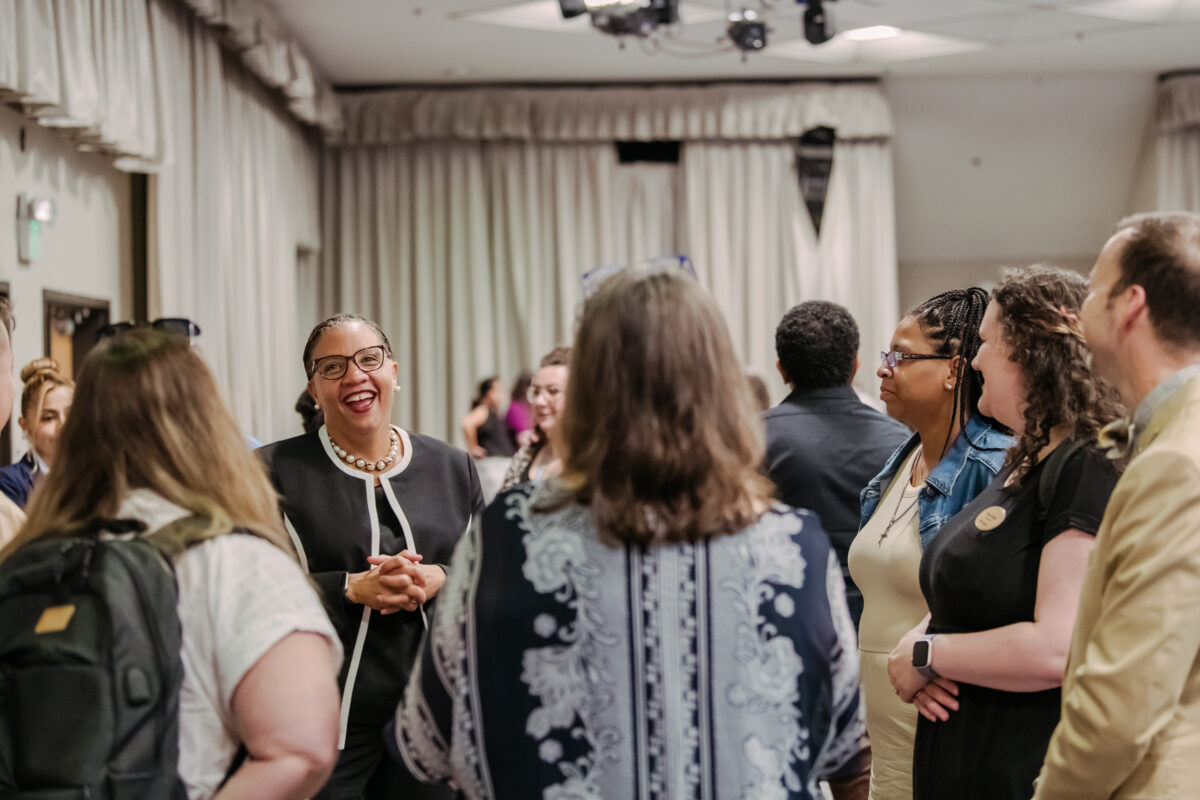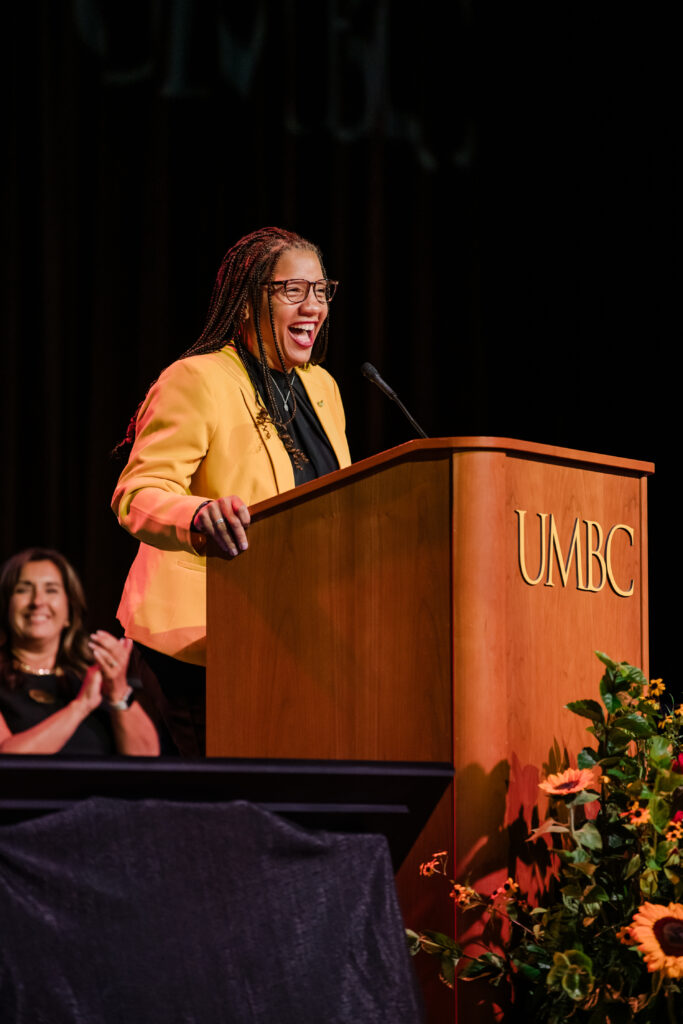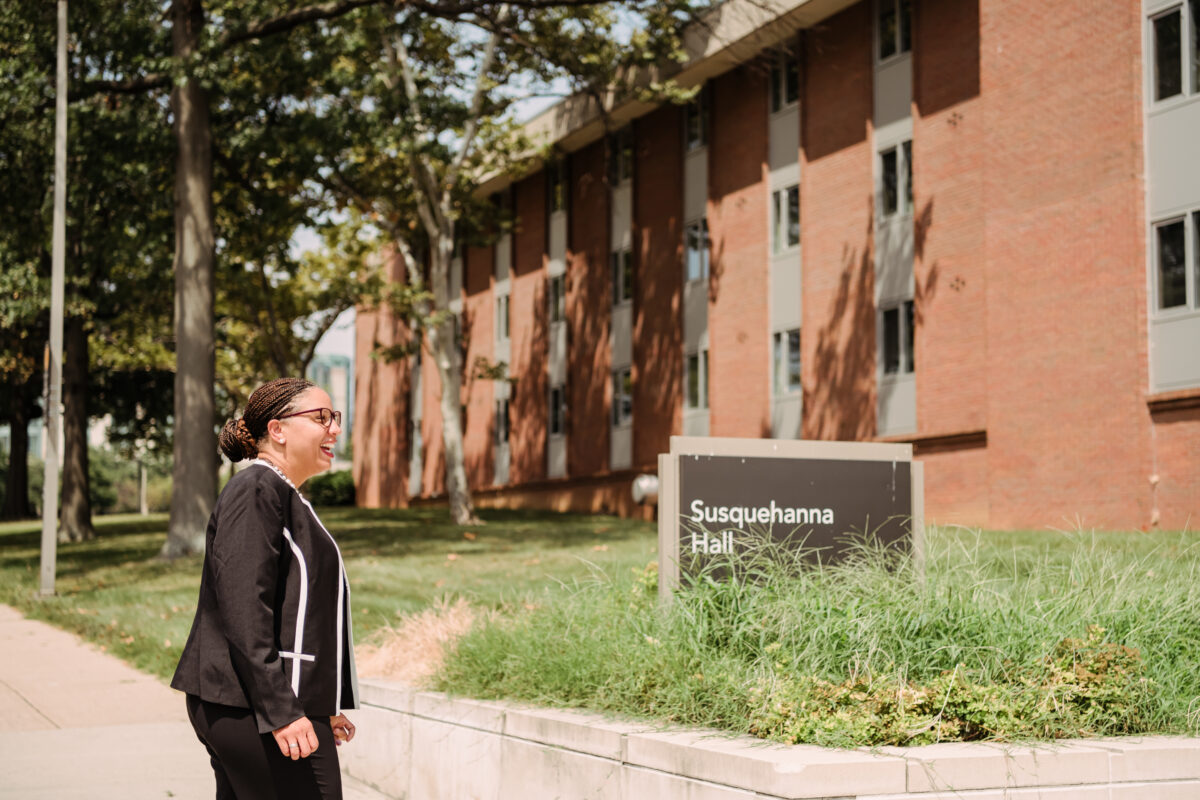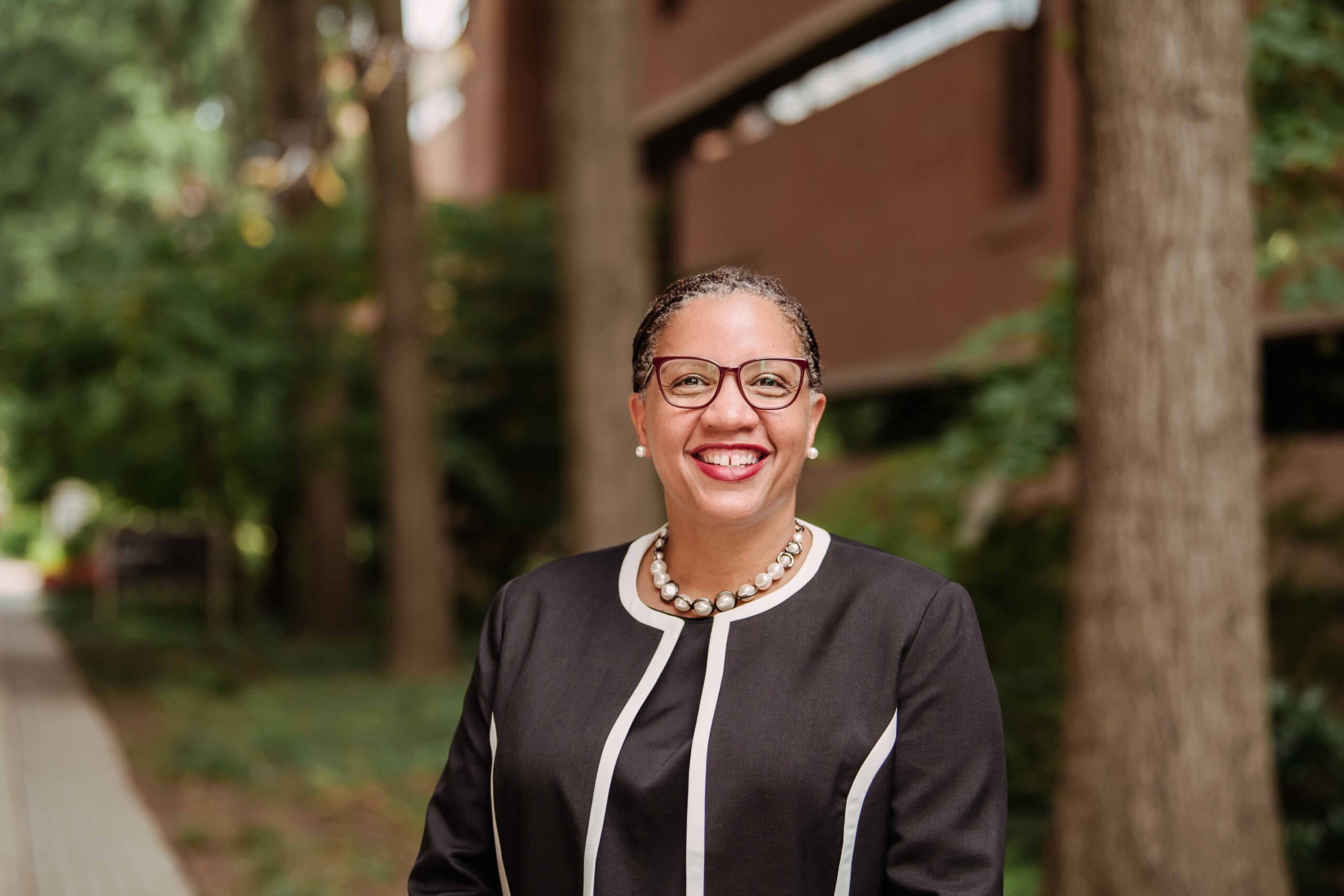Renique Kersh became UMBC’s vice president for student affairs in August 2023, and her first days were a whirlwind that included dropping her sons at school, moving from Boston to Maryland, and attending a number of UMBC welcome events for students and the community.
Now that she’s had the chance to replant her roots at UMBC (her first job out of graduate school was as a community director for Residential Life from 2001 – 2003), Kersh is using her time to listen to the community and bring her expertise to the table as she works with campus leadership and partners to support student success and well-being.
Her excitement and eagerness to be here is evident in the way she enthusiastically talks about UMBC students, staff, faculty, alumni, and families—and the work ahead.
UMBC Magazine: What has excited you the most about being at UMBC so far?
The students! One of the most exciting parts of my interview process was meeting students in person. I appreciate how humble they are and how seriously they take the privilege of being here and caring for our community.
I’ve also loved meeting and hearing from staff and faculty across campus. It’s a phenomenal group with a lot of spirit, energy, and commitment to the university and creating opportunities for students.

Some people have heard me say this already, but it’s true: When we moved from Boston and crossed the border into Maryland, I immediately felt a sense of home. I do believe that this is my home, and it’s where my heart has been for many years. I wake up every morning thankful to be part of such a supportive campus environment.
I’m also honored and humbled to work for a president who is a dynamic leader who deeply appreciates UMBC’s history and is committed to taking the university to the next level. I’m excited to be part of that work too.
I’m grateful for the alumni who have welcomed me, and I look forward to additional opportunities to engage with them and hear about their experiences as students here. I would love to bring alumni who were student leaders during their time here to meet with our current student leaders.
UMBC Magazine: What are your initial goals to connect and support students and the campus—now and future? What is the importance of campus partnerships in student affairs?
I’ve been doing a lot of listening, and I hear five areas where we need to grow: belonging; staff well-being and capacity; space; structure; and synergy. I want to build priorities around what I am hearing.

We are a diverse community but we still need to pay attention to how students feel welcome. Our demographics are changing quickly and as part of our commitment to inclusive excellence we need to have the infrastructure to support the diverse student body. The goal of the Division of Student Affairs is to support and engage both undergraduate and graduate students. To do that fully we need to engage in some difficult conversations in order to build community, while honoring differences and similarities between the two.
We are in need of additional space to support students, staff, and faculty. The pandemic has changed how we use space, and we need to consider these changes and look at how we can use space. We need to find more spaces where students can gather together in the ways we hope for them.
Partnerships across our division and campus are key. We do work better together. Together we can address capacity and efficiency so that students are successful. This includes technology to evaluate success, communication structures, and bringing academics together with co-curricular engagement experiences.
Over the course of my career, I’ve spent a great deal of time in student affairs, and a long time on the academic side of universities as well. Both areas show a care and concern for student success, but sometimes barriers build up between the two. This work cannot be done in silos, and I’m committed to finding the connection points and focusing on ways we can work together.
UMBC Magazine: How do we support students in challenging times?
It’s really important to listen to students and not impose our way of being on them. What do they need? Often, the first things they begin to share with us don’t give us an immediate sense of what they are feeling or need; we have to keep listening and encourage them to tell their story before we respond. What is their concern a symptom of, and how do we diagnose it?
Being present with students also calls for humility and understanding our limitations. Answers aren’t always simple. We have to look at the support systems we offer, and if they don’t have the impact we are hoping for, we may need to change how we do things or consider new ways of doing them.
The mental health crisis is ongoing, so we need to think creatively about what we offer students. That may mean going beyond care appointments to, for example, pop-up spaces with resources and trained facilitators. We know this crisis calls for a major shift in how universities approach this work and that there’s also an impact on faculty and staff, who may struggle to know how to help students while dealing with their own challenges. Sometimes it calls for difficult discussions about students and their responsibility as a member of this community and how they can support themselves and others.
UMBC Magazine: As you began your vice president’s role, you also traveled to Germany in October as part of your Fulbright Administrators Award. What did you learn from the experience?
The experience was transformative both personally and professionally, and I was honored to be one of the 15 leaders chosen from across the country.
First of all, everyone in my group shared their schools’ challenges with equity issues. While our educational systems and our assessment methods are different, we had important conversations and struggled with the idea of trying to change a system that has been in place for quite some time.
I learned that administrators from Germany traveled to Kentucky as part of their Fulbright, and they were shocked by our standard of care. They shared that the level of support and guidance we provide seems excessive and indicated that in Germany the philosophy is that when students turn 18 they are adults who can navigate institutions on their own.

Our conversations led us to discussions about what we can learn from Germans about giving students more space to figure things out and what they can learn from us about meeting students where they are and considering the standard of care that may be needed at each stage of development. In the future, I would love to teach a comparative analysis class and take students to Germany to learn more about their approach to education and care.
In reflecting back, I see the Fulbright as a seed for me and my work, but also an opportunity for my sons to see what is possible for them, too.
UMBC Magazine: In 2022 you were also selected to be an Aspen Institute Senior Impact Fellow. What were the outcomes of this program?
What I loved about this fellowship is that it’s an intergenerational program, so there were leaders in high school and college up to university presidents. We discussed our perspectives on what leadership means and how to create opportunities for experiential equity for students. Some of the things children engage in or are responsible for can be examples of leadership, but are not traditionally acknowledged as such. How do we capture that and provide more resources and support for them?
“Being present with students also calls for humility and understanding our limitations. Answers aren’t always simple.
As part of my fellowship, I co-authored a report focused on the advancement of youth leadership development opportunities. “Advancing Youth Development Leadership Research,” was published in October 2023 under the new name of the organization that spun off of Aspen, The Center for Expanding Leadership and Opportunity, along with an additional report on “The Future of Youth Leadership Development Practice.”
UMBC Magazine: As a leader, how important is self care to you and how do you practice it?
My doctoral research focused on the relationship between stress and the health risks for women leaders in higher education. It’s real, and the more responsibility women have as leaders the more unhealthy they become. This really spoke to me, and as I grow as a leader I’ve never forgotten it. I have to remind myself to take time for me, that no one else will do that for me. For me, this means personal retreats focused on what I need at the time, whether it’s space to think and write or just a relaxing getaway.
In the day-to-day, I love Peloton, and I just started shadowboxing! I also love spending time in community with family and friends.
Interview by Eleanor Lewis
Tags: Residential Life, student affairs

